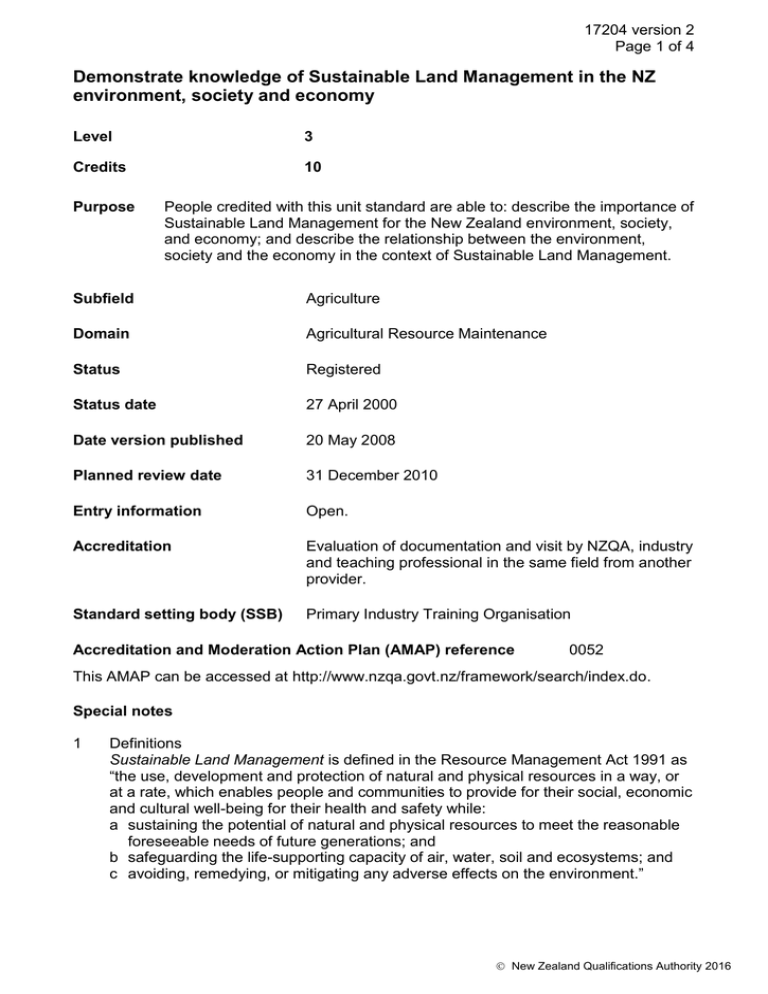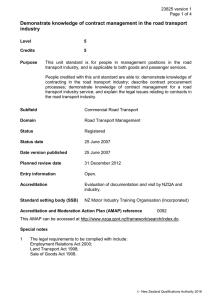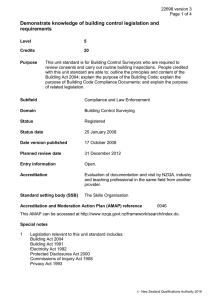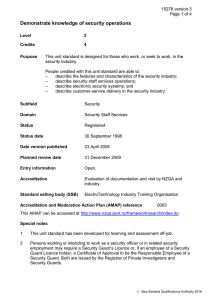Demonstrate knowledge of Sustainable Land Management in the NZ
advertisement

17204 version 2 Page 1 of 4 Demonstrate knowledge of Sustainable Land Management in the NZ environment, society and economy Level 3 Credits 10 Purpose People credited with this unit standard are able to: describe the importance of Sustainable Land Management for the New Zealand environment, society, and economy; and describe the relationship between the environment, society and the economy in the context of Sustainable Land Management. Subfield Agriculture Domain Agricultural Resource Maintenance Status Registered Status date 27 April 2000 Date version published 20 May 2008 Planned review date 31 December 2010 Entry information Open. Accreditation Evaluation of documentation and visit by NZQA, industry and teaching professional in the same field from another provider. Standard setting body (SSB) Primary Industry Training Organisation Accreditation and Moderation Action Plan (AMAP) reference 0052 This AMAP can be accessed at http://www.nzqa.govt.nz/framework/search/index.do. Special notes 1 Definitions Sustainable Land Management is defined in the Resource Management Act 1991 as “the use, development and protection of natural and physical resources in a way, or at a rate, which enables people and communities to provide for their social, economic and cultural well-being for their health and safety while: a sustaining the potential of natural and physical resources to meet the reasonable foreseeable needs of future generations; and b safeguarding the life-supporting capacity of air, water, soil and ecosystems; and c avoiding, remedying, or mitigating any adverse effects on the environment.” New Zealand Qualifications Authority 2016 17204 version 2 Page 2 of 4 Land, air and water are as defined within the Resource Management Act 1991. Short term refers to a time period between 1 and 5 years, and long term refers to a time period of between 5 and 15 years. Local is defined as a commonly recognised geographic region or area for example, Hawkes Bay, Napier, or Wairau Valley. 2 Legislation applicable to this unit standard includes but is not limited to the Resource Management Act 1991 and its subsequent amendments. Elements and performance criteria Element 1 Describe the importance of Sustainable Land Management for the New Zealand environment. Range environment includes – air, soil, water, flora, fauna. Performance criteria 1.1 The term Sustainable Land Management is defined in terms of the New Zealand environment. 1.2 The reasons for Sustainable Land Management are described in terms of the environmental benefits for New Zealand in the short term and long term. 1.3 The effect of legislation on urban, rural, commercial and cultural use of the environment is described in terms of consultation, consents, planning, ongoing monitoring and compliance. Range a familiar local situation, a national issue. Element 2 Describe the importance of Sustainable Land Management to New Zealand society. Range a familiar local situation, a national issue. Performance criteria 2.1 The objectives of urban and rural societies are described in terms of the differing perspectives on Sustainable Land Management. 2.2 The objectives of two differing cultural groups within society are described in terms of the differing perspectives on Sustainable Land Management. 2.3 The objectives of an advocacy and a commercial group are described in terms of the differing perspectives on Sustainable Land Management. New Zealand Qualifications Authority 2016 17204 version 2 Page 3 of 4 2.4 The effect of legislation is described in terms of the planning, consultative and documentary processes, monitoring, and conditions of use required by two segments of society. Range segments of society may include but are not limited to – urban, rural, cultural, recreational, commercial. Element 3 Describe the importance of Sustainable Land Management to the New Zealand economy. Range a familiar local situation, a national issue. Performance criteria 3.1 The differing philosophies of an advocacy and a commercial group are described in terms of their differing perspectives on economic sustainability. 3.2 The differing philosophies of an urban and a rural group are described in terms of their differing perspectives on economic sustainability. 3.3 The effect of legislation on the economic sustainability of a segment of society is described in terms of the planning, consultative and documentary processes required. Range segments of society may include but are not limited to – urban, rural, cultural, recreational, commercial. Element 4 Describe the relationship between the environment, society and the economy in the context of Sustainable Land Management. Range a familiar local situation, a national issue, an international issue. Performance criteria 4.1 The relationship between environmental, social and economic factors in Sustainable Land Management is described in terms of generally complementary goals and objectives. 4.2 The relationship between environmental, social and economic factors in Sustainable Land Management is described in terms of generally conflicting goals and objectives. Please note Providers must be accredited by NZQA, or an inter-institutional body with delegated authority for quality assurance, before they can report credits from assessment against unit standards or deliver courses of study leading to that assessment. New Zealand Qualifications Authority 2016 17204 version 2 Page 4 of 4 Industry Training Organisations must be accredited by NZQA before they can register credits from assessment against unit standards. Accredited providers and Industry Training Organisations assessing against unit standards must engage with the moderation system that applies to those standards. Accreditation requirements and an outline of the moderation system that applies to this standard are outlined in the Accreditation and Moderation Action Plan (AMAP). The AMAP also includes useful information about special requirements for organisations wishing to develop education and training programmes, such as minimum qualifications for tutors and assessors, and special resource requirements. Comments on this unit standard Please contact the Primary Industry Training Organisation standards@primaryito.ac.nz if you wish to suggest changes to the content of this unit standard. New Zealand Qualifications Authority 2016








